Do you believe in soulmates or love at first sight? For some people, they believe in them just as much as they believe in man landing on the moon. For others, they know in their heart when they have found the right person. Where do you draw the line if the other person doesn’t feel the same? In the film Antoine et Colette, or Antoine and Colette, from 1962, directed by François Truffaut, we follow a familiar face all grown up and trying to sweep the love of his life off of her feet. Unfortunately, his efforts are ineffective. The film is not a full-length feature film and stops at thirty minutes, but it is long enough for us to see poor Antoine’s hopes be crushed yet again.
The film is shot in black and white and the beginning is narrated to us over some b-roll of Antoine going about his morning. Once again, the film was shot on location, and we get to see all of the pretty sights and beautifully elaborate French buildings. The narrator tells us what has happened to Antoine from where we left off in The 400 Blows to the present within Antoine and Colette. As a short summary, Antoine grew up in a household that didn’t care for him and lived a life of delinquency – although most of those actions were harmless – and the mental scarring that came from lack of support from his mother and father.
Thus, we begin the film with Antoine now on his own and living out his dream of being self-dependent at the young age of seventeen. The narrator is a funny guy since he sometimes makes fun of Antoine. For instance, we see Antoine’s and Colette’s relationship start to bloom, but the narrator says, “Colette treats Antoine like a friend. He either doesn’t notice or accepts it for the time being” (Antoine and Colette). If this film is based on details from Truffaut’s life, it could be Truffaut looking back on his first love and seeing all the signs he never thought of at the moment, making light of being so naïve.
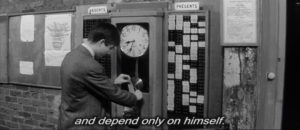
Antoine clocking into his job.
Truffaut cuts out small square windows in some of the frames during the beginning half of the film to highlight essential people or details in the setting. Sometimes, he’ll use it to transition in and out of flashbacks. Antoine is still good friends with his buddy René, and they reminisce about the old days. This is when the square will zoom in on Antoine’s face and then zoom out, revealing the flashback. The square illustrates a few things: with flashbacks, it represents Antoine remembering the flashback, almost like a thought bubble; when positioned in a frame with Antoine or Colette, it helps guide our focus to them since many of the scenes take place in concert halls packed with people.
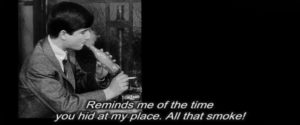
The square zooming in on Antoine.
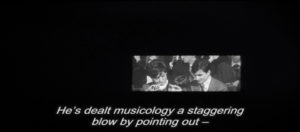
The small square that brings focus to Antoine and Colette.
About halfway through the film, Antoine returns some books to Colette along with his love letter to her confessing his feelings. She is not home, but he gets to meet her parents, who are compassionate and kind – the opposite of how his parents were. One specific detail I noticed was that Colette’s mom and dad looked slightly similar to Antoine’s parents. Both dads have similar noses, and the hair on both of the moms are updos and of a shorter cut. Colette’s parents soon become the parents that he never had, which is why I believe it’s the reason they look similar to Antoine’s.

Antoine’s parents in The 400 Blows.
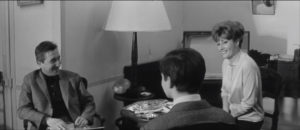
Colette’s parents.
Another aspect of the cinematic language I enjoy is that the film’s music matches the narrative quite nicely. Most times, we assume the music is diegetic by coming from his classical records, but instead of sounding like it’s coming from the corner of the room where his record player is, the music sounds overlaid. Antoine finally gives his love letter to Colette and she replies to him in another letter. Her letter suggests that her feelings are mutual, but she wants to meet up later that night. While he is reading, the music is an orchestra playing what sounds like a grand finale, giving him the perfect background music for his small victory.
By the ending, Antoine has become like a member of the family to Colette’s parents. So much so, that he moves in across the street from them. Even they hope Colette has some romantic interest in Antoine, but Colette starts to be distant. Antoine takes the hint and distances himself from their family for a while. He returns because of a dinner invite, and his and her parent’s hopes are crushed all in one swoop. Colette doesn’t stay for dinner because an older man comes to pick her up and she leaves, with no regard for Antoine’s feelings. After that, the three sit down in front of a TV to watch a show together.
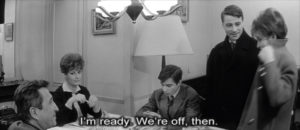
Colette leaving with another man in front of Antoine.
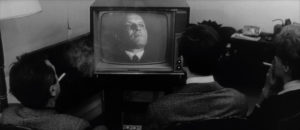
Colette’s parents and Antoine sitting down watching TV.
Antoine tries so hard to hang on to Colette. His need to get her to spend time with him could have been alluding to his grip on life. Although he seems happy and is living out his dream, his parents’ mental scarring took a toll on who he was. Maybe he wanted to prove something to himself, that he was more than his childhood. Yet, his grip slowly starts to fade away just as Colette does, leaving Antoine in the dust and having to face reality on his own again. At least this time, he gained a pair of parental figures who care about him.
This love story goes deeper than just a teenage romance. We see Antoine face the truth of what his life is, and he also loses his first love. Truffaut doesn’t need more than thirty minutes to portray heartbreak and realization. At what point is it okay to feel love for someone or something you can’t control? Even self-love can be hard to find if there are so many things that cause you to want to escape, but you should never use another person as your escape. Truffaut’s message says that love comes in many different forms and you have to know the boundaries between love and escapism.

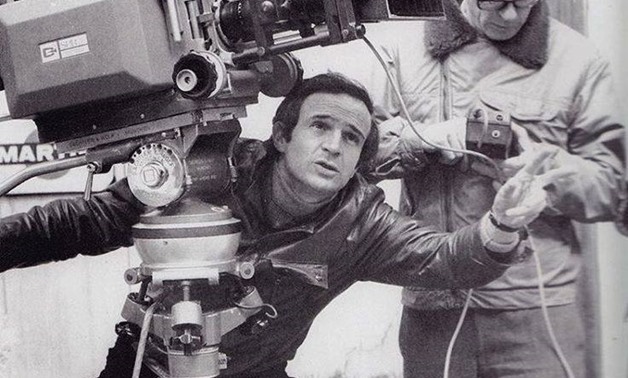
Recent Comments